Tribunal Statistics Quarterly: January to March 2024
Published 13 June 2024
1. Main Points
This publication presents tribunals statistics for the latest quarter (January to March, Q4 2023/24), compared to the same quarter the previous year, alongside annual data for 2023/24.
This publication does not include all the tribunals – parts of Employment Tribunals (ET) and the Upper-tier Tribunal, Immigration and Asylum Chamber (UTIAC) are excluded. The total of the remaining jurisdictions is referred to in this publication and accompanying tables as the ‘Interim Total’ and has been provided to allow like-for-like comparisons over time. Details of what is not included is provided in each of the relevant sections of the main bulletin.
Data from the missing tribunals will be published as soon as they become available, and the data has been checked and quality assured.
| The annual interim[footnote 1] totals of receipts, disposals and open caseload all increased | In 2023/24 His Majesty’s Courts & Tribunals Service (HMCTS) recorded a 7% increase in the interim[footnote 1] total for receipts, and a 16% increase in the interim[footnote 1] total for disposals, when compared to 2022/23. The interim[footnote 1] total for open cases increased by 3% to 653,000 over the same period. |
| Annual SSCS receipts remain above disposals, resulting in an overall increase in open caseload | Compared to 2023/24, Social Security and Child Support (SSCS) receipts remained stable, disposals increased by 3% and open cases increased by 19%. The increase in disposals was driven by increases in Universal Credit and Personal Independence Payment (by 14% and 3% respectively). |
| Annual FTTIAC receipts, disposals and open caseload all increased | First-tier Tribunal, Immigration and Asylum Chamber (FTTIAC) receipts, disposals and open caseload all increased (by 53%, 3% and 65% respectively) in 2023/24 compared to the previous financial year. |
| Annual Employment Tribunal receipts and disposals increased, while open caseload decreased | Single Employment Tribunal (ET) receipts and open cases increased by 8% and 9% respectively, while disposals decreased by 5% in 2023/24, compared to the same period a year ago. In 2023/24 Multiple ET receipts and disposals increased by 7% and 82% respectively compared to 2023/24. Open cases decreased by 4% over the same period. |
| Annual Gender Recognition Certificates receipts, disposals and open cases increased | In 2023/24 there were 1,400 Gender Recognition Panel (GRP) applications received, 1,200 disposals and an open caseload of 890. Annual GRP receipts, disposals and open caseload increased (by 13%, 31%, and 24% respectively) in 2023/24, compared to the same period in 2022/23. |
For feedback related to the content of this publication, please contact us at CAJS@justice.gov.uk
2. Statistician’s Comment
Over 2023/24, both receipts and disposals have increased compared to the same period in 2022/23 (up 7% and 16% respectively). However, the total number of receipts continues to outstrip disposals, resulting in an overall rise in open caseload (up 3%). This increase in receipts is driven predominantly by a sharp upturn in FTTIAC claims in the second half of 2023/24, although the continued increase in SEND claims and a year-on-year rise in both single and multiple employment claims have also contributed to this increase. The rise in disposals is driven by a large ET multiple claims settlement in the second half of 2023/24, whilst SSCS, SEND, Residential Property and First-Tier Tax tribunals have also seen increases in disposals over this period.
In 2023, both SEND registered appeals and appealable decisions have risen to the highest level since recording began in 2014, with a subsequent rise in the rate of appealable decisions to its highest level at 2.5%.
Annual data on adjournments, postponements and sitting days by jurisdiction is included for 2023/24 financial year. The SSCS tribunals continue to account for the majority (around three quarters) of all adjournments, although these have fallen by 18% compared to 2022/23. Total postponements have risen in 2023/24, driven by rises in Mental Health and SEND tribunals (up 10% and 24% respectively).
3. Consultation Response
We recently conducted an internal and external survey to better understand who uses the Tribunals Statistics, how they use them and what changes might help us meet user needs better. The external survey was launched on 14th September 2023 and closed on 31st March 2024. We received 14 completed responses. The finding showed that most respondents use the bulletin, Employment Tribunals, and Gender Recognition tables most frequently, with SSCS, Timeliness, the annual Adjournments and Postponements table (APJ) and the annual Judicial Salaried and fee-paid sittings (JSFP) tables being used to a lesser extent.
There were several suggestions for increased breakdowns of data to a more granular level e.g., age, gender and Local Authority. General feedback also indicates that providing more detail on these breakdowns, more insight as to why specific trends in the data are occurring and better signposting on what information is included within the tables (particularly for annual tables) would be beneficial for users.
We will continue to review all feedback and assess what changes can be made to this publication to help better meet user needs, subject to resource constraints.
Although the closing date for this consultation has now passed, user engagement is a continuous process, and users are invited to submit their comments and suggestions to the team at any time using the contact details at the end of this document.
4. Overview of Tribunals
The Receipts interim[footnote 1] total was 376,000 and disposals interim[footnote 1] total was 345,000 in 2023/24
In 2023/24, HMCTS recorded a 7% increase in the interim[footnote 1] total for receipts, and a 16% increase in the interim[footnote 1] totals for disposals, when compared to the previous financial year. Open caseload interim[footnote 1] total increased by 3%, to 653,000, over the same period.
This publication does not include Upper Tribunal (Immigration and Asylum Chamber) data since Q2 of 2021/22 and Employment Tribunals data for Q1 2021/22 due to database migration as stated above. The total of the remaining jurisdictions is referred to in this publication and accompanying tables as the ‘Interim Total’ and has been provided to allow consistent year-on-year comparisons over time.
This summary bulletin focuses mainly on the Social Security and Child Support (SSCS) tribunal, the First-tier Tribunal Immigration and Asylum Chamber (FTTIAC), and the Employment Tribunal as they made up the majority (77%) of tribunal interim[footnote 1] receipts in January to March 2024:
- Social Security and Child Support (SSCS) - 32% of receipts
- Employment Tribunal – single and multiple (ET) - 26% of receipts
- First-tier tribunal Immigration and Asylum Chamber (FTTIAC) - 19% of receipts
In 2023/24, the receipts interim[footnote 1] total increased by 7% and disposals interim[footnote 1] total increased by 16% compared to 2022/23 (to 376,000 and 345,000 respectively). Open caseload interim[footnote 1] total increased by 3% over the same period and stood at 653,000 at the end of March 2024. This was driven by increases in FTTIAC and SSCS (by 65% and 19% respectively).
Figure 4.1: Receipts interim totals, Q4 2019/20 to Q4 2023/24 (Source: Table S_2)

Figure 4.2: Disposals interim totals, Q4 2019/20 to Q4 2023/24 (Source: Table S_3)

Figure 4.3: Open caseload[footnote 2] interim totals, Q4 2019/20 to Q4 2023/24 (Source: Table S_4)
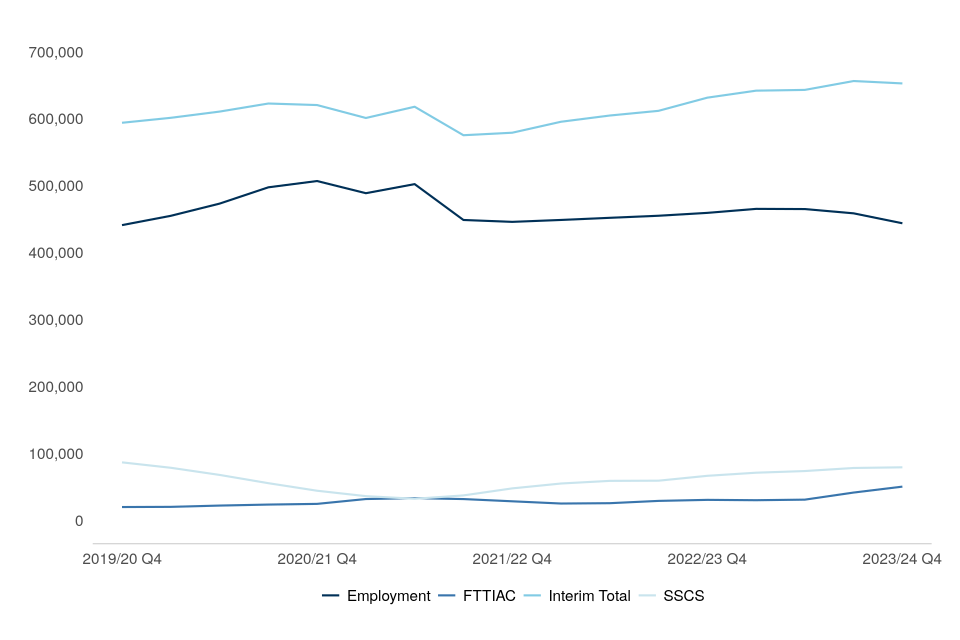
The charts above show the trends in receipts, disposals and open caseload over the last five years for SSCS, FTTIAC, ET, and all tribunals overall (using the Interim Total measure).
In January to March 2024, overall interim[footnote 1] receipts decreased by 1% compared to January to March 2023. This was driven by decreases in SSCS and First-tier Tax Chamber (by 13% and 77% respectively).
Overall interim[footnote 1] disposals increased by 19% in January to March 2024 (to 100,000). The Employment Tribunal disposed of 98% more cases in Q4 2023/24 compared to Q4 2022/23. This is driven by a bulk case of multiple claims for equal pay against Glasgow City Council from November 2023, resulting in the rise in multiple claims in the second half of 2023/24. SSCS and FTTIAC disposals decreased by 17% and 6% respectively over the same period.
5. Social Security and Child Support
In 2023/24, Social Security and Child Support (SSCS) receipts remained stable when compared to 2022/23. Disposals and open caseload increased (by 3% and 19% respectively) over the same period.
Of the 120,000 disposals in 2023/24 62% were cleared at a hearing and of these, 62% had the initial decision revised in favour of the claimant (compared to 68% and 62% in the same period in 2022/23 respectively).
Figure 5.1: Social Security and Child Support receipts, Q4 2019/20 to Q4 2023/24 (Source: Tables SSCS_1)
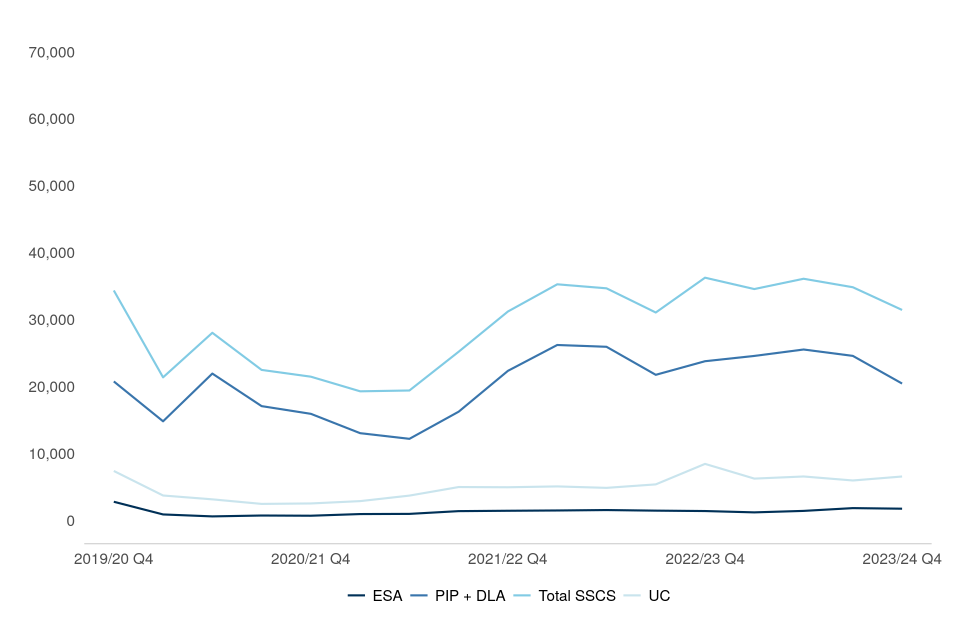
Figure 5.2: Social Security and Child Support disposals, Q4 2019/20 to Q4 2023/24 (Source: Tables SSCS_2)

Figure 5.3: Social Security and Child Support open caseload, Q4 2019/20 to Q4 2023/24 (Source: Tables S_4)
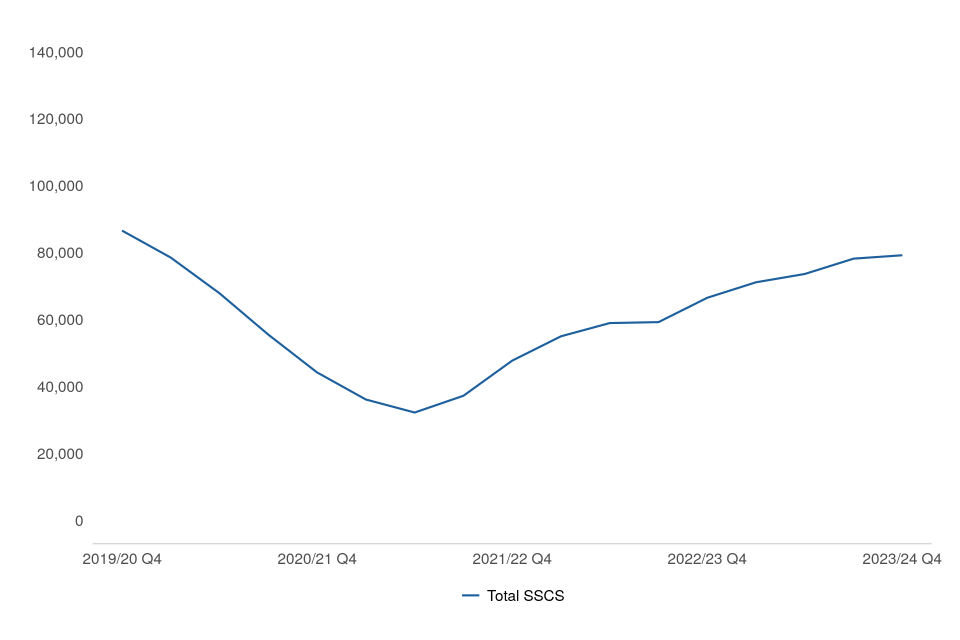
The economic impact of the COVID-19 pandemic resulted in an increase in the number of people on Universal Credit[footnote 3] as the employment rate decreased and economic inactivity increased. The Department for Work and Pensions (DWP) changes to benefit processes in response to the pandemic, such as the temporary suspension of face-to-face assessments for health and disability-related benefits, contributed to the general downward trend in receipts seen during the pandemic. As the policies put in place due to COVID-19 came to an end and restrictions were eased, SSCS receipts increased significantly from Q2 2021/22 and have remained relatively stable in the latest 12 months reported.
In 2023/24, there were 137,000 SSCS receipts, stable compared to 2022/23. Over the same period, disposals increased by 3% to 120,000 in 2023/24. Open caseload stood at 79,000 at the end of the 2023/24 financial year (March 2024), an increase of 19% compared to the same time last year.
SSCS receipts decreased by 13% this quarter, to 31,000 appeals, compared to January to March 2023. This was driven by decreases in Personal Independence Payment and Universal Credit (by 14% and 22% respectively). PIP and UC appeals accounted for 61% and 21% respectively of all SSCS receipts in January to March 2024.
In January to March 2024, SSCS disposals decreased by 17% when compared to the same period in 2023 (from 35,000 in Q4 2022/23 to 29,000 in Q4 2023/24). PIP made up nearly two thirds of SSCS disposals (64%).
Of the disposals made by the SSCS tribunal, 17,000 (57%) were cleared at hearing, and of these, 62% were overturned in favour of the customer (down from 73% and 63% on the same period in 2023 respectively). This overturn rate varied by benefit type, with PIP at 69%, Disability Living Allowance (DLA) 63%, Employment Support Allowance (ESA) 44%, and UC 55%. The PIP, DLA, ESA and UC overturn rates mostly increased compared with January to March 2023 (PIP up 1, DLA up 4, ESA down 6 and UC up 2 percentage points).
There were 79,000 SSCS open caseload at the end of March 2024, an increase of 19% compared to the same period in 2023. SSCS open caseload decreased gradually between Q4 2017/18 and Q2 2021/22 (from a peak of 125,000 to 32,000), only rising in Q3 2019/20. However, SSCS open caseload has started to rise again, increasing in each of the quarters since Q2 2021/22.
Of those cases disposed of by the SSCS tribunal in January to March 2024, the mean age of a case at disposal was 29 weeks, a 3 week increase compared to the same period in 2023 (see table T_2).
6. Immigration and Asylum
First-tier Tribunal Immigration and Asylum Chamber (FTTIAC)
In 2023/24, FTTIAC receipts increased by 53% to 58,000, compared to 2022/23. Disposals increased by 3% (to 39,000), over the same period.
In the same period, open caseload increased by 65% (to 50,000).
Figure 6.1: First-tier Tribunal Immigration and Asylum Chamber receipts, Q4 2019/20 to Q4 2023/24 (Source: Tables FIA_1)
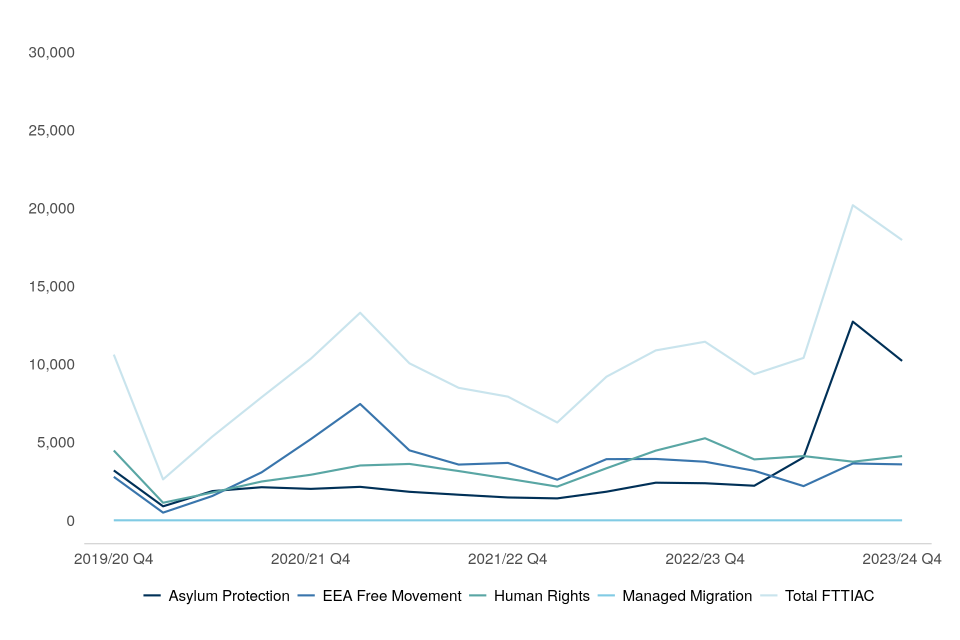
Figure 6.2: First-tier Tribunal Immigration and Asylum Chamber disposals, Q4 2019/20 to Q4 2023/24 (Source: Tables FIA_2)

Figure 6.3: First-tier Tribunal Immigration and Asylum Chamber open caseload, Q4 2019/20 to Q4 2023/24 (Source: Tables S_4)

Following on from a steep fall in Q1 2020/21 due to the impact of the pandemic, FTTIAC receipts started to return to pre-Covid19 levels over the course of the rest of 2020/21. In 2021/22, FTTIAC receipts increased by 52% (to 40,000) compared to 2020/21 and over the course of 2022/23 decreased by 5% (to 38,000) compared to 2021/22. In 2023/24 receipts increased by 53% (to 58,000) compared to 2022/23. The increase in appeals to the FTTIAC follows the Home Office’s work to tackle the backlog of legacy asylum claims.
The proportion of European Economic Area/European Union Settlement Scheme (EEA/EUSS) receipts has decreased since the EUSS route closed for most people to apply on 30th June 2021, now making up 20% of all FTTIAC receipts. In January to March 2024, there were 3,600 EEA/EUSS receipts, a decrease of 5% compared to the same period last year.
Overall, FTTIAC receipts have increased by 57% in Q4 2023/24 compared to the same period in 2022/23. Asylum/Protection (AP) receipts increased by 330% (to 10,000), stemming from the Home Office tackling its legacy asylum decision backlog, and Human Rights (HR) receipts decreased by 22% to 4,100 over the same period. HR and AP proportionally represented 23% and 57% of all FTTIAC receipts respectively (down 23 and up 36 percentage points respectively from a year ago).
In Q4 2023/24, FTTIAC disposals decreased by 6% to 9,900. This fall in disposals was driven by decreases in EEA Free Movement and Deprivation of Citizenship (by 35% and 68% respectively). HR appeals made up the largest proportion (40%) of all FTTIAC disposals in January to March 2024, up from 36% a year ago.
Of the disposals made in the FTTIAC this quarter, 67% were determined i.e. a decision was made by a judge at a hearing or on the papers (compared to 73% in Q4 2022/23); 18% were withdrawn (compared to 15% in Q4 2022/23); 3% were struck out for non-payment of the appeal fee (compared to 3% in Q4 2022/23), and 5% were invalid or out of time (compared to 3% in Q4 2022/23). Around half (48%) of the 6,700 cases determined at a hearing or on the papers were allowed/granted, although this varied by case type (49% of Asylum/Protection, 51% of Human Rights and 43% of EEA Free Movement appeals were allowed/granted).
In the FTTIAC, the mean time taken to clear appeals across all categories is at 43 weeks this quarter, which is 1 weeks less than compared to the same period a year ago. Asylum/Protection, Human Rights and EEA Free Movement had mean times taken of 39 weeks, 45 weeks and 44 weeks respectively.
Upper Tribunal Immigration and Asylum Chamber (UTIAC)
In 2023/24 UTIAC judicial review receipts increased by 29%, to 3,000, compared to the previous financial year. Disposals increased by 26% to 3,500 whilst open caseload rose by 33%, to 1,400, compared to 2022/23.
UTIAC Immigration and Asylum Judicial Reviews
In 2023/24, there were 3,000 Immigration and Asylum Judicial Review receipts, a 29% increase compared to 2022/23. 3,500 cases were disposed of in 2023/24, a 26% increase compared to 2022/23. Open caseload stood at 1,400 at the end of the financial year (March 2024), an increase of 33% compared to 2022/23.
In January to March 2024, there were 940 Immigration and Asylum Judicial Review receipts and 1,200 disposals, an increase of 52% and an increase of 74% respectively on January to March 2023.
Of the 1,200 Immigration and Asylum Judicial Reviews disposed of, 51% were determined and 1% were transferred to the Administrative Court. The remaining 48% were in the ‘Other’ category, which includes cases that were withdrawn or not served.
During January to March 2024, 870 UTIAC Judicial Review applications were determined by paper hearing, of which 15% were allowed to continue to the substantive hearing stage. A further 73 were reconsidered at an oral renewal, of which 92% were allowed to continue to the substantive hearing stage. There were 17 substantive hearings which were determined in January to March 2024 of which 53% were granted in favour of the appellant (see table UIA_3).
7. Employment Tribunals
Employment Tribunal single cases
In 2023/24, the Employment Tribunal received 34,000 single claim receipts and disposed of 31,000 single claim cases. There were 33,000 single claim open caseload at the end of March 2024.
Employment Tribunal lead multiple cases
There were 2,900 lead multiple cases received and 2,000 cases disposed of in 2023/24. The number of open lead cases stood at 6,200 at the end of 2023/24.
Employment Tribunal multiple cases
In 2023/24 there were 59,000 Multiple claim receipts, 72,000 disposals and open caseload stood at 410,000 at the end of March 2024.
Employment Tribunals transitioned to a new database (Employment Case Management) during March to May 2021. It has not been possible to provide full results from both databases during this migration period on a consistent basis. Therefore, Employment Tribunal (ET) data is not available for Q1 2021/22, and as a result we are unable to present data for the full financial year of 2021/22.
Again, from September 2022, the Employment Tribunal are migrating to a new case management system (ECM Reform), as a part of this move they have taken the opportunity to review the legacy case load to ensure that the volume of cases captured in the open caseload accurately reflects cases being progressed through the system and that all cases with a final outcome have been recorded accurately and are removed from this count. This has led to differences in volume between earlier versions of the statistics and this publication.
Due to the migration process, the data on Employment Tribunals does not include jurisdictional breakdown for receipts or disposals. The Employment Tribunal timeliness cannot be provided due to there being no jurisdictional data. The jurisdictional data in the ECM Reform database will be made available as soon as possible when the data is extracted and quality assured.
In Q4 2023/24, there were 25,000 Employment Tribunals (ET) receipts, 35% (8,800) of which were single claims receipts, and the remaining 65% (16,000) were multiple claims receipts, with 730 lead multiple cases. The ET disposed of 40,000 cases in Q4 2023/24. At the end of Q4 2023/24, there were 444,000 open cases.
Figure 7.1: Index of Employment Tribunals single and multiple claim receipts, Q4 2019/20 to Q4 2023/24 (Source: Tables S_2)

- Baseline 2019/20 Q4
Figure 7.2: Index of Employment Tribunals single and multiple claim disposals, Q4 2019/20 to Q4 2023/24 (Source: Tables S_3)
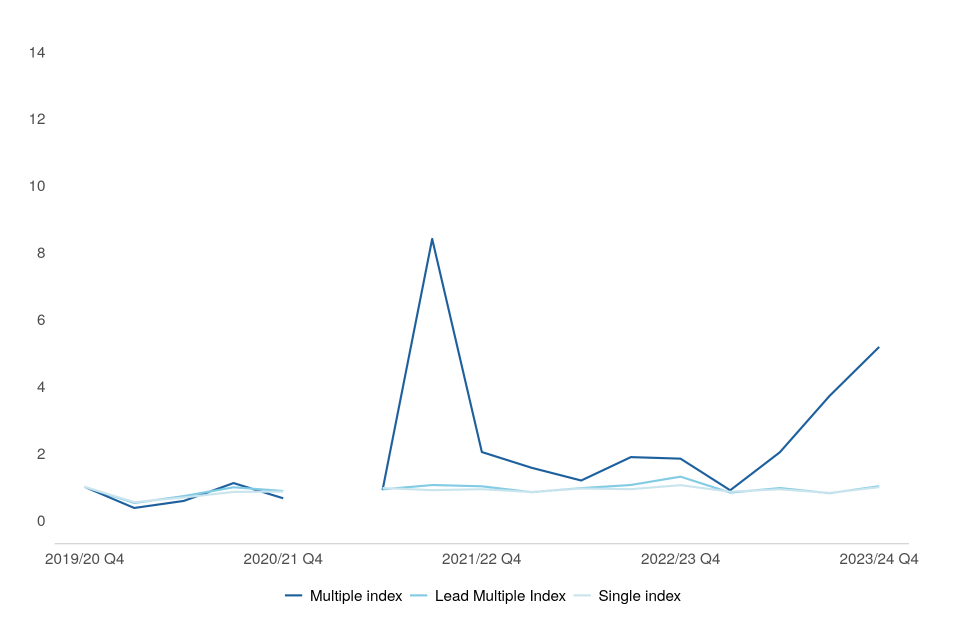
- Baseline 2019/20 Q4
Figure 7.3: Index of Employment Tribunals single and multiple claims open caseload, Q4 2019/20 to Q4 2023/24 (Source: Tables S_4)
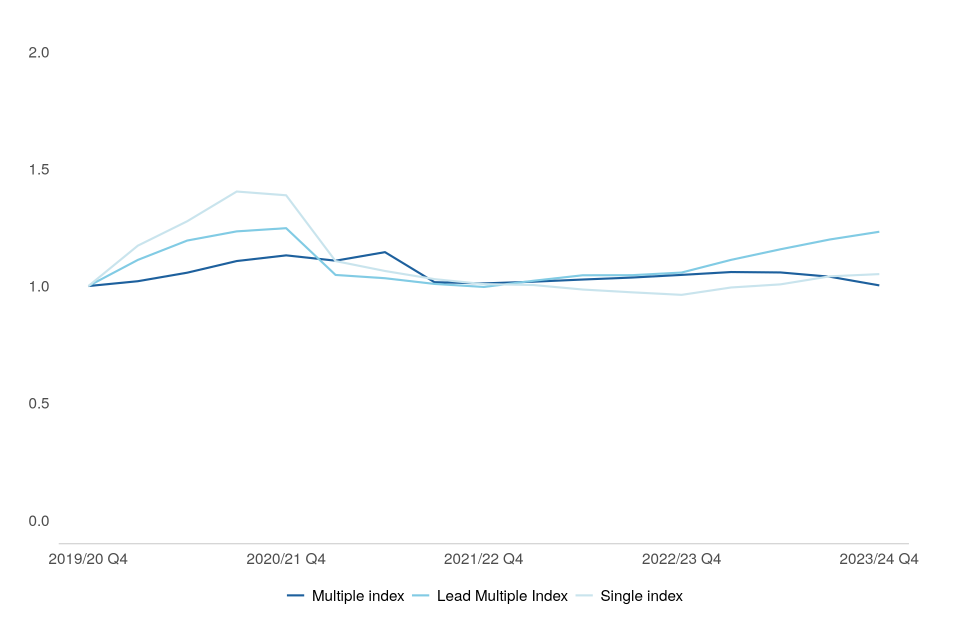
- Baseline 2019/20 Q4
Single claim open caseload (at 33,000) has fallen from a peak of 44,000 since Q3 2020/21, although this is up 9% compared to the same period in 2022/23.
There were 16,000 multiple claims received this quarter. Multiple claims tend to be more volatile as they can be skewed by a high number of claims against a single employer.
The peaks seen in the disposal chart in Q3 2021/22, Q3 2023/24 and Q4 2023/24 are due to large spikes in multiple claims:
- A dismissal judgment was issued in December 2021 for 48,000 British Airways claims covering 71,000 jurisdictions. These claims had been withdrawn over a number of years but given the volume and restrictions with the old case management system these had not been formally closed until now, hence the spike. This figure is expected to be revised again as there is still closure action to take place on some of the claims.
- From November 2023, a bulk case of multiple claims for equal pay against Glasgow City Council have been settled and subsequently withdrawn, resulting in the spike in disposals in Q3 and Q4 2023/24.
8. Gender Recognition Certificates
1,397 Gender Recognition Panel (GRP) applications were received and 1,248 were disposed of in 2023/24; 888 applications were pending by the end of March 2024
The number of GRP applications received in Q4 2023/24 decreased to 364, a fall of 9% compared to Q4 2022/23. Of the 270 applications disposed of, a full Gender Recognition Certificate (GRC) was granted in 82% of cases (222 full GRCs), down 7 percentage point compared to the same period in 2022/23 (where 265 full GRCs were granted out of 297 disposals).
GRP receipts have increased annually since 2017/18, particularly more recently following a reduction in the application fee in May 2021 from £140 to £5, and the move to an online application process in July 2022. This has come at the same time as an increase in both the open caseload and refusals. Open caseload reached 888 cases in Q4 2023/24, while 12% of all disposals (33 cases) have been refused. Applications can be refused if they do not meet the required criteria. More information on the criteria can be found at the following link: Apply for a Gender Recognition Certificate - GOV.UK (www.gov.uk) (URL:https://www.gov.uk/apply-gender-recognition-certificate).
Since April 2005/06, when the Gender Recognition Act 2004 came into effect, 65% of interim certificates (171 of the 264 interim GRCs granted) have been converted to a full GRC, 52% of which were converted within 30 weeks. No interim certificates were converted to a full GRC between January to March 2024. The Divorce, Dissolution and Separation Act (2020), which took effect from 6th April 2022, changed the process for no fault divorces, reducing the need for interim certificates; we therefore expect to see a considerable drop in these. Of the 222 full certificates granted in January to March 2024, 22 were for married applicants and 197 for single applicants. 119 (54%) of the individuals granted full certificates were registered male at birth while 103 (46%) were registered female at birth.
Figure 8.1: Applications for Gender Recognition Certificates received, disposed of and pending, Q4 2019/20 to Q4 2023/24 (Source: Tables GRP_1 and GRP_2)

Figure 8.2: Full Gender Recognition Certificates granted by year of birth, Q4 2019/20 to Q4 2023/24 (Source: Table GRP_4)
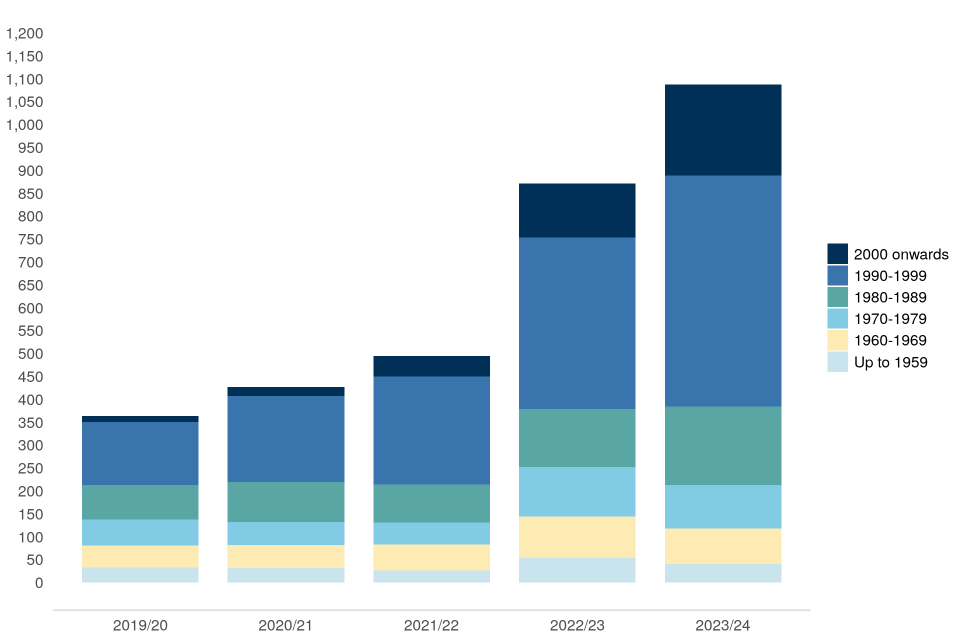
9. Adjournments and Postponements
Adjournments reported on have decreased by 17% in 2023/24 compared to the previous year, driven by a 18% fall in SSCS adjournments.
SSCS adjournments decreased from 23,000 in 2022/23 to 19,000 in 2023/24; making up 74% of the 26,000 adjournments in the year. FTTIAC adjournments decreased from 2,900 to 2,100 over the same period.
Postponements reported on increased by 4% in 2023/24, driven mostly by SEND and Mental Health tribunals which represent 26% and 33% of all postponements reported in 2023/24 respectively.
The number of tribunal postponements increased by 4% to 29,000 in 2023/24, driven mostly by a 24% and 10% increase in SEND and Mental Health tribunal postponements respectively.
Social Security and Child Support tribunals had the largest number of adjournments (19,000) which accounted for 18% of SSCS listed hearings (down 2 percentage points on 2022/23). Mental Health tribunals had the smallest proportion of listed hearings that were adjourned 8% of all Mental Health hearings listed in 2023/24, down 1 percentage points on 2022/23.
The postponement process is different for each tribunal, as such, care must be taken when comparing the postponement figures. As an example, in the SEND tribunal, the case is listed for hearing when the appeal is registered without confirming availability of the parties to attend on that date, whereas in SSCS the date is only set when the parties agree a date. This results in a high number of postponements for the SEND tribunals as the parties may not be able to attend on the scheduled date. This can be for various reasons. These may include holidays; illness; key witnesses unavailable on the date of the hearing; the case simply not ready for hearing or where the tribunal is able to hear an appeal sooner with parties’ consent.
Figure 9.1: Percentage of listed hearings Adjourned and Postponed – SEND, 2022/23 to 2023/24 (Source: Table APJ_1)

This difference in the process of scheduling involved in the SEND tribunals leads to a relatively large proportion of its listed hearings being postponed - 68% in 2023/24 (80% in 2022/23). The number of SEND postponements increased year-on-year, from 620 in 2013/14 to 4,500 in 2019/20. In 2020/21 this number fell to 3,200. This decline is due to the use of remote hearings during the pandemic making attending hearings easier for participants. However, in 2023/24 the number of SEND postponements increased again to 7,600.
Figure 9.2: Percentage of listed hearings Adjourned and Postponed – by jurisdiction, 2023/24 (Source: Table APJ_1)
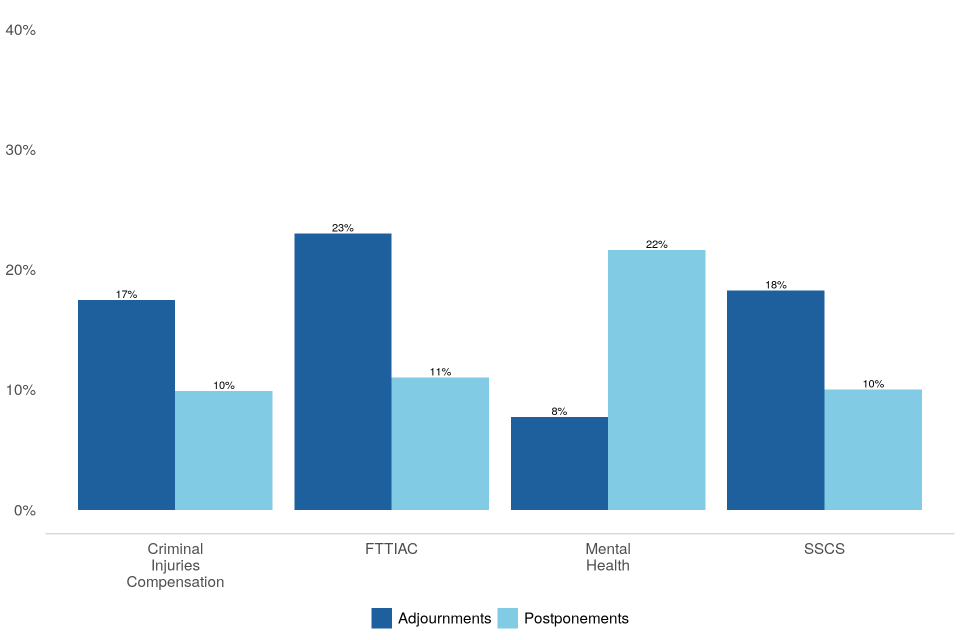
The percentage of SEND tribunals with postponements has fallen slightly, down from 80% of listed hearings in 2022/23 to 68% in 2023/24. The absolute number of SEND postponements increased by 24% to 7,600 in 2023/24. SSCS and Mental Health represented the largest proportion (36% and 33% respectively) of postponements.
10. Tribunal Judicial Salaried and Fee-Paid sittings by Jurisdiction
The recording of Sitting days varies greatly across Tribunals:
- Interlocutory (Chambers) days are not included within the sitting days calculations for the Immigration and Asylum Chamber, SSCS or ET tribunals but these are included for the Mental Health tribunal and Special tribunals.
- For SSCS, judicial sittings relate to half-day sessions and therefore the SSCS figures are not comparable to the other tribunal sitting days.
As part of data improvement, work is ongoing to ensure Sitting days are recorded on a consistent basis across all the Special tribunals. As part of this work, it has been found that sitting days for the Criminal Injuries Compensation tribunal do not include interlocutory (Chambers) sitting days. The data will be refreshed as far as possible once this work is complete and quality assured, in the meantime caution should be used when comparing these figures to sitting days in other tribunals. In addition, initial work on the Mental Health Tribunal showed that non-judicial sitting days make up a large proportion of the sitting days that are published in this report, and any work to revise the sitting days is likely to reduce the number of days reported by a significant factor, particularly for the Mental Health tribunal.
SSCS (25%) and Mental Health (27%) judicial sittings continue to make up a large proportion of all sittings
In 2023/24, there were 44,000 SSCS judicial sittings, down 6% (from 47,000) on 2022/23. In the same period, Mental Health judicial sitting days decreased by 3% to 46,000.
The vast majority of sittings in the Mental Health and SSCS tribunals were fee-paid.
Fee Paid sittings accounted for 63% of all tribunal judicial sittings in 2023/24, while salaried sittings accounted for 37%. Of the 108,000 fee-paid judicial sittings in 2023/24, 65% were for the Mental Health and SSCS tribunals.
Judicial sitting days at the SSCS continued their downward trend seen since 2018/19, with 44,000 sittings, a decrease of 6% compared to 2022/23. The majority of these sittings were fee-paid (65%).
Mental health sittings decreased this year by 3% (to 46,000), of which 90% were fee-paid.
The number of judicial sitting days at the FTTIAC increased by 8% to 15,000 in 2023/24.
Figure 10.1: Judicial Salaried and Fee-paid Judicial Sittings, 2023/24 (Source: Tables JSFP_1 & JSFP_2)
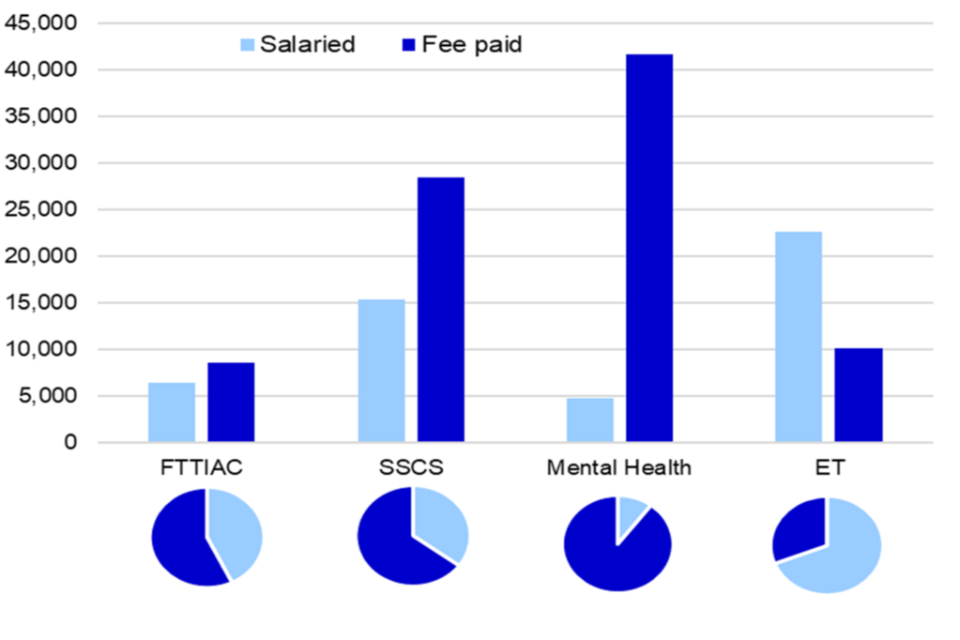
11. Other Tribunals
Decrease in First-tier tax Chamber receipts by 45% in 2023/24 compared to the previous year
The First-tier Tax Chamber recorded 12,000 receipts in 2023/24, a decrease of 45% compared to 2022/23. In the same period, 9,500 appeals were disposed of and open caseload increased by 2% (to 51,000).
First-tier Tax Chamber
There has been a decrease in all case types in the First-tier Tax Chamber this quarter. Receipts decreased by 77%, to 1,800, compared to the same quarter last year. Disposals and open caseload also increased by 23% and 2% to 2,300 and 51,000 respectively. This follows sharp increases in some quarters since Q2 2021/22 as Treasury and HMRC have taken action against umbrella companies employing potentially fraudulent VAT schemes.
Figure 11.1: First-tier Tax Chamber receipts, disposals and open caseload Q4 2019/20 to Q4 2023/24 (Source: Tables S_2, S_3, and S_4)
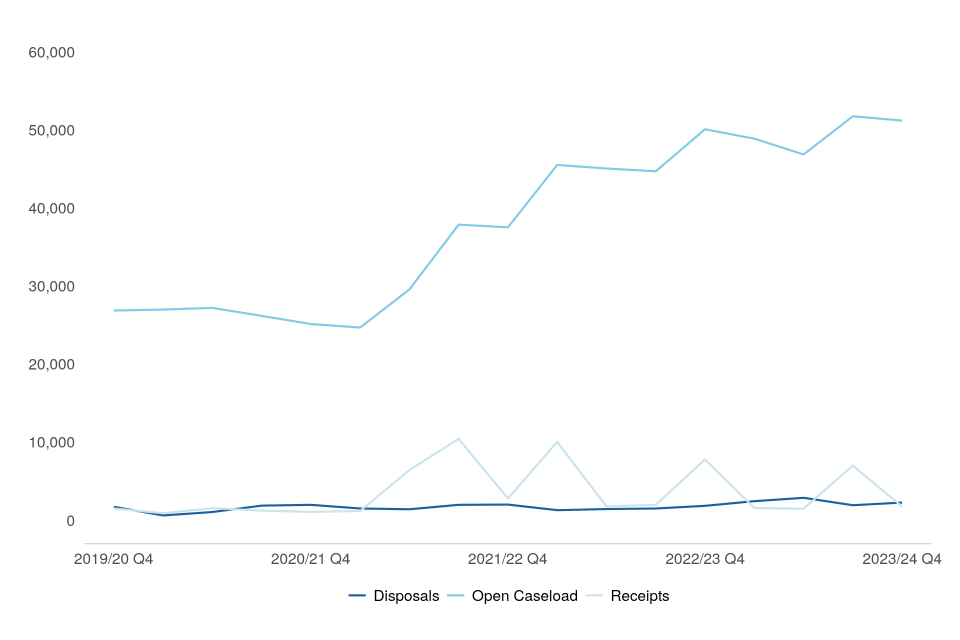
Special Educational Needs and Disability (SEND)
Increase in Special Educational Needs and Disability (SEND) receipts by 31% compared to 2022/23
Special Educational Needs and Disability (SEND) recorded 18,000 receipts in 2023/24, the highest amount in any year in the timeseries and an increase of 31% compared to the previous year. In the same period, 14,000 appeals were disposed of - the highest number disposals in any year in the timeseries, and open caseload rose to 8,300 increases of 32% and 49% respectively.
SEN reforms in 2014 introduced Education Health and Care plans (EHCPs) and extended the provision of support from birth to 25 years of age. In addition, the National Trial which began in April 2018 enabled the Tribunal to make non-binding recommendations on the health and social care elements of the EHC plan. Those provisions were mainstreamed with effect from 1 September 2021.
Figure 11.2: Special Educational Needs and Disability (SEND) receipts, disposals and open caseload Q4 2019/20 to Q4 2023/24 (Source: Tables S_2, S_3, and S_4)
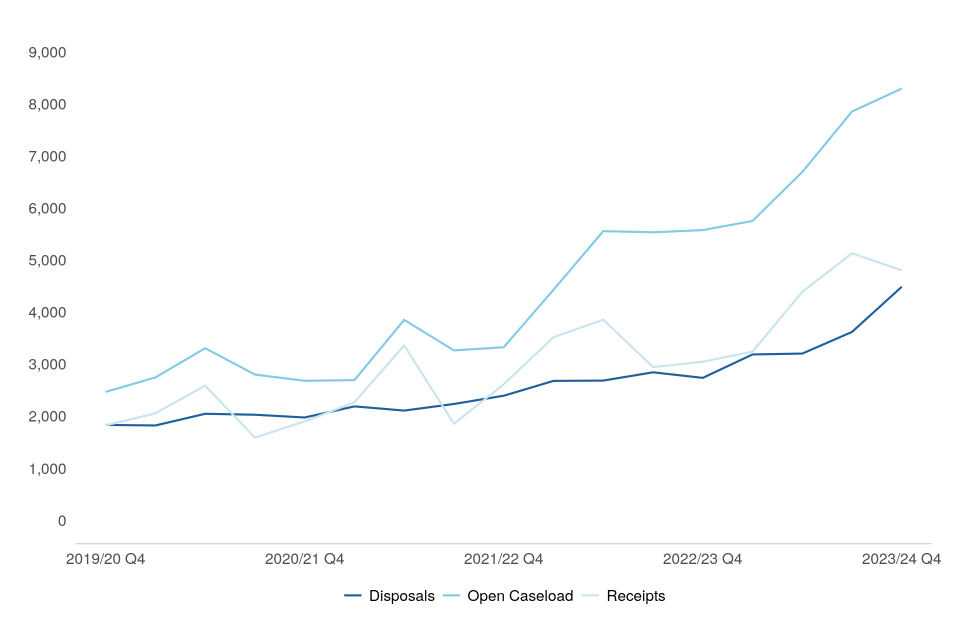
SEND Rate of Appeal
In the 2023 calendar year, there were 16,000 SEND and 618,000 total appealable decisions, an increase of 22% and 12% respectively when compared to 2022, both reaching the highest recorded level since reporting began in 2014. This gave an overall appeal rate of 2.5% in 2023, up from 2.3% in 2022. This is the highest rate since 2014.
12. Further information
Rounding convention
Figures greater than 10,000 are rounded to the nearest 1,000, those between 1,000 and 10,000 are rounded to the nearest 100 and those between 100 to 1,000 are rounded to the nearest 10. Less than 100 are given as the actual number.
Accompanying files
As well as this bulletin, the following products are published as part of this release:
-
A supporting document providing further information on how the data is collected and processed, as well as information on the revisions policy and legislation relevant to trends and background on the functioning of the tribunal system.
-
The quality statement published with this guide sets out our policies for producing quality statistical outputs for the information we provide to maintain our users’ understanding and trust.
-
A set of overview tables, covering each section of this bulletin, an annual set of tables covering Special Educational Needs and Disability appeals for the calendar year 2023.
-
A set of CSV files including data on two of the three large tribunals (SSCS and Immigration and Asylum) and an overall receipts and disposals CSV, covering all tribunal types.
-
Additional releases this quarter:
- Update to the statistical notice on Immigration and Asylum (I&A) Detained Immigration Appeals (DIA) to include data to Q4 2023/24.
Future publications
Our statisticians regularly review the content of publications. Development of new and improved statistical outputs is usually dependent on reallocating existing resources. As part of our continual review and prioritisation, we welcome user feedback on existing outputs including content, breadth, frequency and methodology. Please send any comments you have on this publication including suggestions for further developments or reductions in content.
Official Statistics
Our statistical practice is regulated by the Office for Statistics Regulation (OSR).
OSR sets the standards of trustworthiness, quality and value in the Code of Practice for Statistics that all producers of official statistics should adhere to.
You are welcome to contact us directly with any comments about how we meet these standards.
Alternatively, you can contact OSR by emailing regulation@statistics.gov.uk or via the OSR website.
Contact
Press office - email: pressofficecourtslaw@justice.gov.uk
Other enquiries and feedback on these statistics should be directed to the Data and Evidence as a Service division of the Ministry of Justice:
Rita Kumi-Ampofo or Laura Jones - email: CAJS@justice.gov.uk
Next update: 12 September 2024 (URL: www.gov.uk/government/collections/tribunals-statistics)
© Crown copyright Produced by the Ministry of Justice
For any feedback on the layout or content of this publication or requests for alternative formats, please contact CAJS@justice.gov.uk
-
The interim totals for the overall volumes of tribunal receipts, disposals and open caseload exclude the Upper Tribunal (Immigration and Asylum Chamber) for which the data is currently not available. See the main tables S_2, S_3 and S_4 for more information. ↩ ↩2 ↩3 ↩4 ↩5 ↩6 ↩7 ↩8 ↩9 ↩10 ↩11 ↩12 ↩13 ↩14 ↩15
-
Open caseload is based on a snapshot in time based on the last day of each quarter. ↩
